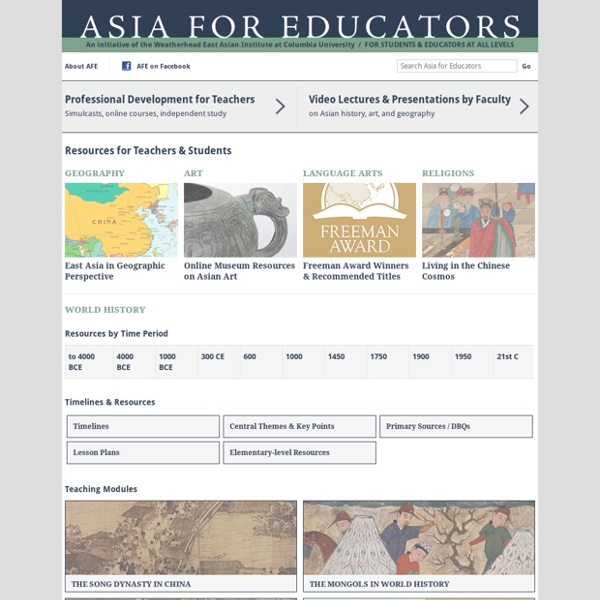



http://afe.easia.columbia.edu/
Related: ASIA PACIFIC STUDIES • HistoryEast Asia's Geography Through the 5 Themes, 6 Essential Elements, and 18 Geographic Standards In approaching the complexity of China, Robert W. McColl's article Understanding the Geography of China: An Assemblage of Pieces** [Education about Asia] provides the most important information needed to understand the regional subdivisions of China, with useful cues as to how to remember the "pieces" and their relationships to each other. This article is also used in Standard 11 of this unit. Getting started with Assessment for Learning Glossary Active learning Learning which engages students and challenges their thinking, using a variety of activities. Assessment for learning Essential teaching strategies during learning to help teachers and students evaluate progress in terms of understanding and skills acquisition, providing guidance and feedback for subsequent teaching and learning. Closed question A question that can be answered with either a single word (usually ‘yes’ or ‘no’) or a short phrase and the choice of answers is limited.
Asia Pacific Institute of Advanced Research We know how challenging it can be to develop and compile quality research for a book or chapter for publication. Collaborating with contributors and an exhaustive review process are only two of several hurdles. APIAR is here to support your efforts. Experienced editors will work with you at every stage to guarantee that the finished product represents your hard work and dedication. Acquisitions As communist China turns 70, a 'Great Fracture' emerges with US Mike Pompeo, Wang Yi are posing for a picture: US Secretary of State Mike Pompeo meets China's State Councilor and Foreign Minister Wang Yi at the United Nations Seventy years after the founding of communist China, once rosy predictions of coexistence with the United States have dissipated with expectations rising instead of a long-term, globe-spanning rivalry. The United Nations General Assembly showcased the harsh new tone between the world's two largest economies, with US President Donald Trump declaring from the rostrum that the age of tolerance for China's "abuses" was over. Representing China at the annual summit of leaders, Foreign Minister Wang Yi vowed that his country -- "with a 5,000-year civilization" -- would never be cowed by threats. UN Secretary-General Antonio Guterres voiced worries in his own address as he pleaded for international cooperation. "Two decades later, this theory has been tested and proven completely wrong," Trump said in his UN address.
Revisiting Hitler, in a New Authoritarian Age In a 2018 volume of the German Yearbook of Contemporary History devoted to new research on Hitler, the editors Elizabeth Harvey and Johannes Hürter identified a recent “Hitler boom,” an unexpected increase in German research into Hitler beginning around 2013. But they’re wary of ascribing that upswing to public concerns. Academics, Harvey said, are largely not responding to “the worrying upsurge today of right-wing extremism, anti-Semitism, racism, right-wing populism, extremist leader figures” by thinking, “Right, I’m going to go write a better biography of Hitler to cure that.”
E-Books » Brill Online - Asian Studies The complete alphabetic list of Brill's e-books. Filter by subject: < Any subject Asian Studies [814] Kronstadt Uprising – Seventeen Moments in Soviet History Texts Images Video Other Resources Subject essay: James von Geldern The naval base of Kronstadt lies on Kotlin Island near the head of the Gulf of Finland. Asian countries Learn about ADB activities in member countries and regional offices. Get information on country economic data and analysis, development assistance, and regional initiatives. indicates that ADB has a resident mission in that country. * Developing members: Afghanistan, Armenia, Azerbaijan, Bangladesh, Bhutan, Brunei Darussalam, Cambodia, Cook Islands, People’s Republic of China, Georgia, India, Indonesia, Fiji, Hong Kong, China, Kazakhstan, Kiribati, the Republic of Korea, Kyrgyz Republic, Lao People’s Democratic Republic, Malaysia, Maldives, Marshall Islands, Federated States of Micronesia, Mongolia, Myanmar, Nauru, Nepal, Pakistan, Palau, Papua New Guinea, Philippines, Samoa, Singapore, Solomon Islands, Sri Lanka, Taipei,China, Tajikistan, Thailand, Timor-Leste, Tonga, Turkmenistan, Tuvalu, Uzbekistan, Vanuatu, Viet Nam
The legacy of autocratic rule in Tanzania - from Nyerere to life under Magufuli The Arusha Declaration of 1967 is a defining document in Tanzania’s and Africa’s post colonial history. It began a process of nationalisation and rural collectivisation which was then replicated in other parts of the continent. As one of the few countries in East Africa not beset by internecine conflicts, Tanzania is often seen as a beacon of hope. But the country’s history hasn’t been entirely peaceful.